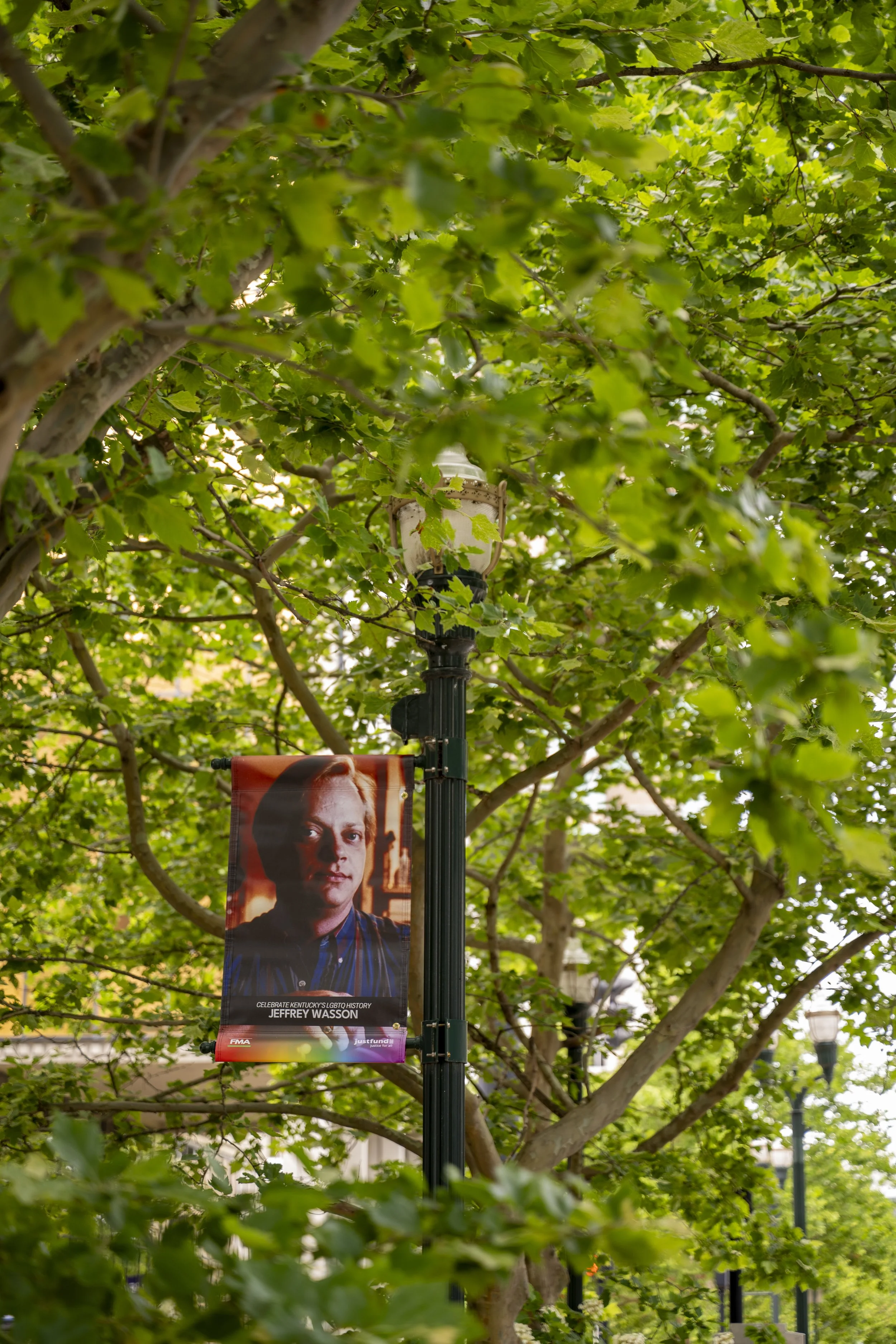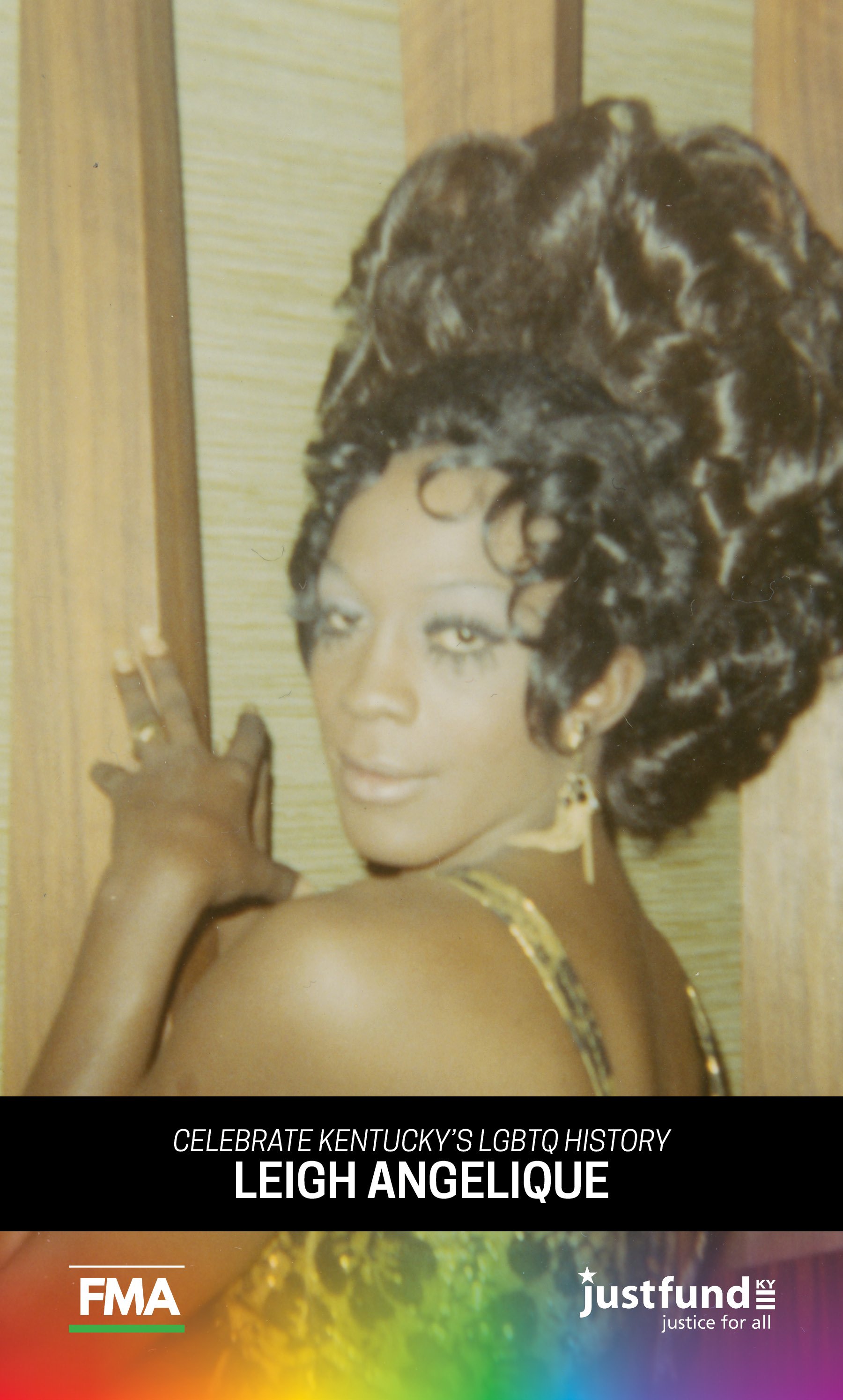Lexington Street Banners
Celebrate Kentucky’s LGBTQ HistoryFMA is proud to honor some of the iconic individuals and organizations who have made a major impact on Kentucky’s LGBTQ history on street banners throughout downtown Lexington. At a time when our LGBTQ community is constantly under attack, finding he joy can be difficult. However, looking to the past provides a unique opportunity to remind ourselves that queer people are in Kentucky and have always been in Kentucky and will forever be in Kentucky. Here, Kentucky’s rich queerness is on full display!
This project aims to highlight the enduring legacy of Lexington's LGBTQ community and these banners provide a small glimpse into the broader narrative of queer history in this city and throughout the state. Every single person walking or driving down Vine Street will be confronted with these images of queer joy! Our vision at FMA is to live in a world where the LGBTQ community is protected, included, and celebrated without question. By displaying these stories to the general public, we hope to provide a sense of belonging to LGBTQ Kentuckians and to unequivocally affirm our community’s place in the rich tapestry of Kentucky’s past, present and future.
This project was made possible with the support of JustFundKY and the LFUCG Mayor’s Office.
LEARN MORE ABOUT thOSE FEATURED
Amber Moon Productions
Founded in 1979, Amber Moon was an all-female nonprofit organization dedicated to bringing nationally known musical acts, unique educational opportunities, and cultural arts events to the Lexington area. While open to everyone, Amber Moon’s programming especially resonated with women, particularly lesbians. Their events regularly drew hundreds of women. Throughout the 1980s, Amber Moon served as an important cultural platform, enriching the community and fostering connection through the arts. Read More…
Photo of Barbara Dumesnil, Phyllis Giberson, Mary Dunn, and Sue Ann Salmon by Christy Porter for the Lexington Leader, February 18, 1982.
CHARLES WILLIAMS
Charles was a visionary self-taught Black artist who was living with AIDS but died from starvation in Lexington in 1998. His premature death was an example of the grave impact socioeconomics and race have on people with AIDS. That year, in tribute to Charles, AIDS activist Michael Thompson launched the food delivery service Moveable Feast Lexington with Carol Farmer. The organization delivers fresh meals and groceries to people with low incomes living with HIV/AIDS. Read More…
Photo of Charles Williams, undated.
The Fairness Campaign
In 1999, two Kentucky cities made history by passing landmark legislation to protect LGBTQ Kentuckians from discrimination. Louisville passed a citywide Fairness Ordinance on January 26, outlawing employment discrimination with protections for both sexual orientation and gender identity.
Lexington followed on July 8, passing the state’s first countywide Fairness Ordinance. The Lexington-Fayette Urban County Government ordinance went even further than Louisville’s in its efforts to ensure protections in employment, housing, and public accommodations (such as bars, restaurants, and other public venues).
Achieving these victories took years of organizing by groups like Lexington Fairness, the Lexington Human Rights Commission, and Kentucky Fairness Alliance. Now more than 20 Kentucky cities and counties have passed their own Fairness Ordinances, ensuring local protections where state laws fall short. Read More…
Photo of Lexington parade by Laura Harris, July 3, 1999.
Henry Faulkner
One of Lexington’s most famous LGBTQ icons, the nationally renowned painter Henry Faulkner, helped plant the seeds of Kentucky’s early gay scene.
Born in rural Kentucky in 1924, Henry came of age during a time when it was not socially acceptable, or safe, to be an “out” gay man. But that did not stop Henry from being his authentic self—exuberant, eccentric, flamboyant—even when it resulted in ridicule, violence, arrests, a vice raid on his home, or stints in psychiatric hospitals.
Henry was a poet and an unabashed performer—on and off stage. But in the late 1950s, it was his vividly hued, fantastical oil paintings of animals, still-life compositions, and outdoor scenes that brought him success and catapulted him into the world of art and literary elites, like James Leo Herlihy and Tennessee Williams, who would become Henry’s lifelong friends.
In Lexington, in the early days, he roomed for a time with the inimitable Sweet Evening Breeze. Throughout the ’60s, Henry was often seen traipsing about town with his beloved goat Alice. Read More…
Photo of Henry Faulkner in drag, 1942.
Jeffrey Wasson
In 1985, an entrapment sting at The Bar Complex ultimately led the Kentucky Supreme Court to strike down the state’s sodomy law. One night in the back parking lot, an undercover officer began flirting with 23-year-old Jeffrey Wasson. Wasson ended up being one of several men arrested for “soliciting” that night—and the only one to challenge his arrest. The case—Wasson v. Commonwealth—lasted nearly seven years and came at great personal cost to Wasson, but in 1992 he won. And his victory helped decriminalize homosexuality across the U.S. Read More…
Photo of Jeffrey Wasson by Ron Garrison for the Herald-Leader, 1993.
Leigh Angelique
Leigh Angelique was a Black drag performer in Lexington from the 1960s-’80s. On April 8, 1970, 22-year-old Leigh was arrested with Tiffy Ross, Brenda Dee, and another drag queen named Jill—in a raid at The Living Room for the crime of “wearing a disguise.” Leigh went to Sweets for help. Angered by the injustice, Sweets called the judge on the case and insisted it was "in his best interest to drop the charges” against Leigh. He complied. From then on, Leigh and Sweets celebrated the anniversary as their “Bastille Day.” Later, Leigh would say, “I don’t know what Sweets had on the people in this town, but she had something.”
In 1971, a sociology student named Janice Engsberg spent the fall traveling to Angelique’s performances in Kentucky drag bars, taking photographs and recording quips from Leigh and her fellow queens. Engsberg relocated to the Pacific Northwest, but sent the album home to Kentucky 45 years later. Read More…
Photo of Leigh Angelique by Janice Engsberg, 1971.
The Pagan Babies
In the 1970s, Robert Morgan took on a drag alter ego, Peggy Fury, and attracted a circle of guerilla artists and drag queens. They helped embody his artistic visions. Under Robert’s creative direction, they worked together on experimental theater projects, photo shoots, and films.
The group became known as the Pagan Babies. Their collaborations with the photographers John Denny Ashley and R. Michael Walker, and filmmaker Jean Donohue, eventually led to the creation of a book of photography and essays, as well as a documentary film. Read More…
“Eclipse” photo of The Pagan Babies by John Denny Ashley, circa 1970s.
Sweet Evening Breeze
Sweet Evening Breeze, was a local LGBTQ celebrity in Lexington for more than 60 years. Born in the 1890s as James Herndon in Scott County, Sweets bucked the social mores of her time and boldly chose to live as her authentic queer self.
In the 1930s, Sweets performed in drag in the Creole Follies minstrel shows at Woodland Park Auditorium. She also played the bride in a series of “womanless wedding” events (a popular Southern folkloric tradition through the 1940s)—with quarterbacks from the all-white University of Kentucky football team as her grooms. Even after 1960, when a city ordinance banned “cross-dressing,” Sweets continued to wear both masculine and feminine clothing, makeup, and fashion accessories.
Sweets witnessed nearly a century of life in Lexington. She not only earned tacit acceptance in the community, but her free spirit, gender nonconformity, and flair made her a stand-out figure in the city’s history. Sweet Evening Breeze died in 1983—and was buried as James Herndon. Read more…
“Mother Of Us All” photo of Sweets in her home, surrounded by her collection of silver, by John Denny Ashley, 1979.
Tri-State Gay Rodeo Association
The Tri-State Gay Rodeo Association was founded in 1989 as part of the International Gay Rodeo Association (which is still around today!). Consisting of members from Kentucky, Ohio, and Indiana, they would ride their horses; they would go to rodeos; they would host cookouts; they would hold these dances. They were really taking ruralness on as a queer behavior in and of itself. While TSGRA dissolved in 1995, these images from a 1991 photo album perfectly illustrate the long-lasting legacy of queerness in rural Kentucky. Read More…
Photo from Tri-State Gay Rodeo Association album, 1991, collection of Terry Mullins and Bill Chandler.
Women’s Collective
This communal-living group formed in Lexington in the early 1970s. The Women’s Collective was dedicated to establishing a strong lesbian-feminist community and sharing, debating, and promoting feminist and lesbian literature. The group also engaged in social justice initiatives. Its consciousness-raising groups and events attracted women from across the state, creating a space for dialogue, empowerment, and solidarity. The women in the collective helped lay the groundwork for lesbian-focused advocacy and activism in Kentucky. Read More…
Photo of Lexington Women's Collective, early 1970s.
Interested in LEARNING MORE?
COME AND RESEARCH AT FMA!
Dive into Kentucky's rich LGBTQ history with access to over 15,000 items and 250 hours of oral history. Whether you're a researcher, artist, activist, or simply curious, our archives are open to all.






















